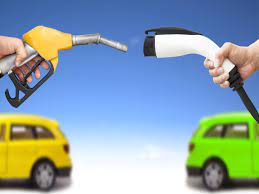हाल के समय में भारत सरकार ने वाहनों में विद्युत चालित वाहनों के लिए बड़े योजनाओं की शुरुआत की है। इसके साथ ही विभिन्न विश्वविद्यालयों और रिसर्च संस्थानों ने विद्युत चालित वाहनों के उपयोग में बढ़ोतरी करने के लिए कई अध्ययन किए हैं। लेकिन, क्या भारत विद्युत चालित वाहनों के लिए तैयार है?
पहले से भारत में विद्युत चालित वाहनों का उपयोग होता है, लेकिन वे अभी तक अपनी असामान्य खरीद कीमत के कारण आम लोगों के लिए अनुपयुक्त हैं। भारत में विद्युत चालित वाहनों की संख्या भी कम है। लेकिन, भारत सरकार ने विद्युत चालित वाहनों के लिए उत्साहपूर्ण योजनाएं शुरू की हैं और वह इन वाहनों को बढ़ावा देने के लिए कई नीतियों को लागू कर रही है।
इसके अलावा, भारत में विद्युत चालित वाहनों के लिए रिचार्जिंग स्टेशन की कमी है। लेकिन सरकार ने इस मुद्दे को हल करने के लिए कदम उठाए हैं।
India is one of the world's fastest-growing economies, and it is grappling with multiple challenges that require swift action, including rising levels of pollution, increasing fuel costs, and a growing dependence on imported oil. The adoption of electric vehicles (EVs) could help address these challenges, and the Indian government has set ambitious targets for EV adoption in the country. However, whether India is ready for electric vehicles is a complex question that requires careful consideration of several factors.
check price of battery charger
One of the primary factors that will determine whether India is ready for electric vehicles is the availability of charging infrastructure. Electric vehicles require frequent charging, and this means that a robust network of charging stations must be in place to support widespread adoption. While India has made significant progress in this area, with the government announcing plans to set up 2,636 charging stations across 62 cities, there is still a long way to go before charging infrastructure is available throughout the country.
Another factor that will determine whether India is ready for electric vehicles is the availability of affordable and high-quality EVs. India has a thriving automobile industry, but it has been slow to embrace electric vehicles due to concerns about high costs and limited demand. However, the situation is changing rapidly, with a growing number of Indian and foreign automakers launching electric vehicles in the Indian market. The Indian government is also offering incentives and subsidies to promote the adoption of EVs, which could make them more affordable for consumers.
The availability of renewable energy is also a critical factor in determining whether India is ready for electric vehicles. EVs are only truly sustainable if the electricity used to charge them comes from renewable sources such as wind, solar, or hydroelectric power. While India has made significant progress in increasing its renewable energy capacity, it still relies heavily on fossil fuels to generate electricity. This means that the environmental benefits of electric vehicles may be limited in some parts of the country.
Another challenge facing the adoption of electric vehicles in India is the lack of public awareness and education about the benefits of EVs. Many consumers are still hesitant to switch to electric vehicles due to concerns about range anxiety, charging infrastructure, and the perceived higher costs of electric vehicles. However, initiatives such as public awareness campaigns, educational programs, and test drives could help increase awareness and overcome these barriers.
Finally, the government's policies and regulations will play a critical role in determining whether India is ready for electric vehicles. The Indian government has set ambitious targets for EV adoption, but it will need to provide further incentives and support to help achieve these targets. This could include tax breaks, subsidies, and other incentives to promote the adoption of electric vehicles.
In conclusion, India has made significant progress in preparing for electric vehicles, but there are still several challenges that need to be addressed. The availability of charging infrastructure, affordable and high-quality EVs, renewable energy, public awareness, and supportive government policies are all critical factors that will determine the success of electric vehicles in India. If these challenges can be overcome, India could be well on its way to becoming a leader in the global transition to electric mobility



0 Comments